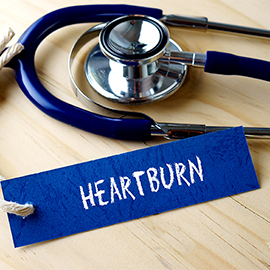23
Aug
Northside Hospital offers new minimally invasive treatment for GERD
 A new device at Northside Hospital is helping some chronic reflux sufferers find lifelong relief.
A new device at Northside Hospital is helping some chronic reflux sufferers find lifelong relief.
Gastroesophageal Reflux Disease (GERD) is a chronic, often progressive disease resulting when the lower esophageal sphincter, the muscle at the base of the esophagus, is weak and does not close properly. This allows harmful stomach acid and bile to flow, or reflux, from the stomach back into the esophagus.
GERD is one of the most common health problems for adults, affecting about 20 percent of the U.S. population. Symptoms include heartburn, regurgitation, coughing and chest pain. Left untreated, GERD can damage the lining of the esophagus, worsen asthma symptoms and cause more serious problems such as bleeding ulcers or Barrett’s esophagus, a leading cause of esophageal cancer.
“Most heartburn and GERD sufferers respond to medical management with simple lifestyle changes and the use of acid-suppression drugs like Prevacid®, Nexium®, and Prilosec®,” said Dr. Srinivasa Gorjala, general surgeon at Northside Hospital. “These drugs help reduce gastric acid production, but they do not repair the weak esophageal sphincter and, therefore, allow reflux to continue.”
Dr. Gorjala is the first surgeon at Northside Hospital in Atlanta to use the LINX® System to treat patients with chronic GERD.
LINX is a small ring, or bracelet, (about the size of a quarter) comprised of interlinked titanium beads with magnetic cores. Through several keyhole incisions in the abdomen, the ring is implanted around the sphinctor. It does what the failing muscle can’t; it reinforces the body’s natural barrier to reflux. The ring is flexible and the magnetic beads allow it to open and close safely to let food down, but it resists opening to prevent gastric acids from pushing back up into the esophagus.
The device is implanted during a standard minimally invasive laparoscopic procedure and takes about an hour. It is performed on an outpatient basis. Patients generally go home immediately after surgery.
LINX has been available to patients for about one year. Dr. Gorjala has implanted about 50 devices. He says that it has shown to be very effective in patients with chronic GERD.
“Patients don’t feel the device once it’s implanted and the titanium construction and the permanent magnets mean LINX is designed to offer lifelong treatment to patients with GERD,” said Dr. Gorjala.
Northside Hospital’s Advanced Center for GI Therapeutics offers the latest, most innovative procedures to diagnose and treat GI (gastrointestinal) conditions. A full range of GI endoscopy diagnostic, therapeutic and treatment procedures are performed including upper endoscopy, ERCP, colonoscopy, endoscopic ultrasound (EUS), ablation therapy and high-resolution manometry. Patients receive all of their treatment – from registration through discharge – in one convenient location, dedicated to caring for the GI patient, on Northside’s Atlanta campus.
For more information about LINX and other GERD treatments available at Northside Hospital, call 404-250-6691.
About Northside Hospital (www.northside.com)
The Northside Hospital health care system is a 926-bed, not-for-profit health care provider with more than 150 locations across Georgia, including three acute care, state-of-the-art hospitals in Atlanta, Cherokee County and Forsyth County. Northside Hospital leads the U.S. in newborn deliveries, diagnoses and treats the most cancer cases in Georgia and is among the state’s top providers of surgical services. Northside has more than 2,500 physicians and 15,000 employees who serve 2.5 million patient visits annually across a full range of medical services.




Northside Hospital offers new minimally invasive treatment for GERD